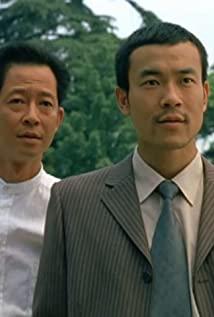The intricate lust of the characters grows, and the ambiguity between the two heroines. The eight people in the prisoner's dilemma, how the emotional defense line is getting thinner and thinner, and how is it gradually collapsed. Love is like a frail and sudden cold, which is placed between prisoners struggling in human nature, also known as Stockholm Syndrome.
The script is not as focused on suspense and mystery as "The Conspiracy". In order to take care of others, "The Sound of the Wind" has weakened a lot in the clues of reasoning and wits. There are some settings that are far-fetched and inappropriate.
First of all, the setting of the background, conspiracy" is Chiang Kai-shek's white terror killing the Communist Party. The beginning of "The Wind" is the assassination of the underground party, and the end is the revenge assassination, cutting the throat. Although throughout the ages, international and domestic revolutions have all started in the form of terrorism, but after all, in today's global counter-terrorism, it is obviously not so flattering to emphasize that the Communist Party was once a terrorist organization, as the main line of contradictions.
Secondly, the director did not focus on confusing the audience, basically suspecting one, killing one, suspecting one, and killing another. In this way, it took a lot of effort to invite them all to an isolated villa on a cliff. What's the point. It's better to be punished as soon as you come up, until you die. The only cover is for the old ghost in Ming to steal the spotlight and protect the old gun in the dark. The publicity before the release was also trying to make everyone guess who the old ghost is, so the old gun is the last suspense.
It is a spy film that comes up to tell the truth to the audience, and it is a spy film that makes the audience follow along, and it is not revealed until the last minute. It is a mystery film that makes the audience follow the guesswork.
Then, tell the story and the characters. The characters die one by one, guessing who is the spy "Old Ghost". In fact, this should be a secret room murder reasoning game. Wisdom wrestling and psychological games should be the focus, but torture steals the limelight. The horror of the trapped beast should lie in the uncertain psychological struggle.
The interrogator and the suspect are two small groups. The confrontation and attack between the two groups should be second. The focus should be on the two groups of people who have their own ghosts and show their abilities. The dog bites the dog, and the situation gradually gets out of control. . However, the settings of several characters are full of personality, but they are clueless, and the structure cannot afford suspense and variables.
Group of suspects: Everyone attacked each other at first, and then they stayed on their own and went their separate ways. It frustrates the watchers guarding the bugs and binoculars.
In fact, attacking each other is not necessarily super smart, or small-minded, or deep, or crazy enough, or sinister enough. In such a dangerous situation, in order to protect oneself, casually biting can be a fatal blow. must be uncontrollable. It's a pity that the director created the characters with their own characteristics, and they are inextricably linked in private, but the surface is only for viewing and has no actual combat effectiveness.
Su Youpeng played the sissy white adjutant, and she was strong enough. The sentence "I have a black background from everyone here" should have been extremely lethal. But Xiaobai has neither brain nor heart, he has a lofty attitude, and is blindly innocent to the point of death.
Yingda played the timid and fearful confidential director Jin Shenghuo, who trembled with fright at every turn. I thought he was buried deep in the city, but he trembled to the end and bravely committed suicide.
Zhang Hanyu played Wu Zhiguo, the leader of the bandit suppression team. He was brave and ruthless, and most of the torture was greeted by him. Life is as hard as a stone. It should be said that in the end he survived not because of his wisdom, but because of his physique that was different from ordinary people.
Li Bingbing and Li Ningyu, the only characters who emphasized wisdom, looked calm and unremarkable at first, and looked a bit powerful. Later, it was found that it was only the arrogance of women in the face of men, not the calmness in the face of the enemy. She is wise, but she is too aloof, and disdains to bite others. After being stripped and measured, she can only cry and cry, "I, the top student at the University of Pennsylvania, is not a prostitute." Aloof, self-controlled, fearful, maternal, and feminine Son, Li Bingbing's acting is really good, she cried beautifully and has a little taste.
Zhou Xun, Gu Xiaomeng. Glamorous, frivolous and willful, she was drunk, teased the little warrior, tried to make phone calls secretly, and reported others many times. As the answer to the mystery, her movements were too loud and her body was full of flaws, which subverted the hidden and calm image of the boss in the mystery film. It was also possible that there was actually a big boss behind her, and she was obviously attracting all the attention. This role is of course the most intelligent, the problem is that without a matching opponent, it will not show a high score.
Judges group: The commander holds military power, Takeda is Japanese, Wang Tianxiang is a cruel officer. Everyone is good at winning and should be jealous of each other. As a result, they were all led by the Japanese. Could it be that these three characters are set up to let everyone know how the two important Chinese ministers will obey the demoted Japanese officers? Even if you lose your physique, you shouldn't lose your intelligence to judge the situation.
Takeda should be indifferent like surgical metal, full of wisdom, hiding his inner cowardice and inferiority, and finally his madness gradually lost control. Huang Xiaoming shaved his hair and beard to learn Japanese, deliberately hard, deliberately rough, it can be seen that he worked hard and hard, and he did a good job. It's a pity that in front of Shi Zhaoqi and Wang Zhiwen, he still looks like he is still young. The two would be willing to obey him, neither script nor performance was convincing.
A young Japanese officer should be crushed by two Chinese officers who are older, stronger, and higher in rank than him. He should be stronger in personality and wisdom, sharp, paranoid and terrifying. He is enough to conquer other accomplices, not his. identity, but rather his intelligence and madness. In other words, the character itself was designed to be a little weak, and for a 30-year-old to play it, it would be difficult for anyone to overwhelm the other two.
General Zhang, played by Shi Zhaoqi, appeared domineering, but his brain capacity was not commensurate with his rank. He had the strength to restrain Takeda, but at most he questioned him a few times, and then he followed the lunatic as a fool.
Wang Tianxiang, played by Wang Zhiwen, is a cruel official of the Wang puppet regime. Regardless of his appearance, his puppy, or his fur coat. Even if he was kicked by General Zhang like a pug and knelt up to light a cigarette for Takeda, no matter how he looked at it, he was pretending, and in the end he had to be the boss. But in the end, his death was worthless, and his slick back was hanging down a few wisps at the occasion, and he looked like a traitor. This role, played by Wang Zhiwen, is over.
In addition, I think Wu Gang's acupuncture doctor is the best. There are few scenes, and the tone is full, which is good.
The emotion of a movie is its soul.
Looking back from the results, after the dust settles, remembering a person with a piece of clothing is obviously the way of "Brokeback Mountain". The code sewn into the seam of the clothes, in a progressive tone like a summary statement, is still unfinished, and it is clear that the revolutionary cause is a responsibility and responsibility, and only if the people I love understand me is the essence.
The director is probably a detail control, very fond of capturing facial expressions, often a big face on the whole screen. Every two people talking together, their faces are very close, including the execution, the camera is also very close. It may be because the director let the actors drink alcohol to brew their emotions before shooting. Everyone was very ambiguous, and there was a strong and obscure lust in the air. It may be a bit too much to say that love is a bit too much. The director does not pay attention to discovering a deep and unforgettable love. He only needs all the possible meanings of the relationship between people and the topicality and commercial value caused by it.
Love may be a Stockholm syndrome.
Stockholm Syndrome, also known as the hostage complex, refers to a complex in which the victim has feelings for the perpetrator and even helps the perpetrator in turn. In this film, I take the liberty to expand, not only referring to the feelings of the victim towards the perpetrator, but because both parties are in an extremely isolated state, they easily become dependent on the objects around them.
In fact, in the end, it is impossible to say who has imprisoned who. In this isolated mountain village, everyone is a prisoner. A suspect imprisoned by an interrogator, an interrogator imprisoned by a mystery. Everyone is in a prisoner's dilemma where they are forced by the situation and cannot ride a tiger. Cultivating lust in the forbidden room, at this time, lust has become the only option to relieve pressure. Opposition but interdependence makes them more psychologically dependent on their enemies.
Takeda for Li Ningyu, Wu Zhiguo and Gu Xiaomeng, as well as the deleted Jin Huosheng and Bai Xiaonian. Domestic films have never lacked the main theme, but lacked ambiguous and delicate emotions... They lacked the various possibilities of emotional heresy.
Especially Wang Zhiwen's performance was very tense. First, he took a box of biscuits and said to Xiaomeng, "I'm here." Before the execution, against Xiao Meng, whose hair was wet, her eyes were sloppy, and she was wearing a petticoat with a suspender, her palm tightly held her waist, and she gritted her teeth to force her to confess guilt quickly. Scattered and eager eyes revealed how reluctant he was to torture her with his own hands. When the execution was executed, he turned his back and showed a look of unbearable expression on his face. This is the love of an executioner.
Maybe love is like this. In order to fight against some kind of predicament and bondage in life, whether it is loneliness, cold, loneliness, worldly pressure, poverty, panic, emptiness, unease...and the need for love arises.
A peaceful and complete person will not blindly sink in love.
In addition to the logical structure, the ambiguous relationship between Li Ningyu and Gu Xiaomeng is what I think is the most topical highlight of this film. The trend of neutrality and same-sex ambiguity are not uncommon in the film market in recent years. The subtle push between two beauties is a relatively literary and artistic commercial symbol. It is rare in the mainland, but it is a common plot in Taiwanese movies. Director Chen Guofu is a relatively successful commercial director in Taiwan. He directed works "Middle School Girls", "My Beauty and Sadness", "Marriage Notice", and supervised the productions "20, 30, 40" and "If You Are the One". element. Although it is a genre film, it is obvious that feelings are always the personal label that the director cannot erase, and it is the potential main line that he tries to hide and express.
Yes, it's very exciting to return to Zhou Xun's best love scene. Gu Xiaomeng helped Li Ningyu to mend her clothes. The two of them leaned on the sofa, worried about the situation. Gu Xiaomeng looked at her with a charming gaze, and took the initiative to express her dependence and trust in Yujie. Li Ningyu couldn't help holding her hand, and the two pressed their foreheads against her. , snuggle together and say the words to take care of each other.
The scenes are all placed in Zhou Xun's eyes.
At first, Gu Xiaomeng sat on the sofa and stared at something. Those eyes were completely different from the drunken turbid, little girl's mischievous elf before, with a faint smile and deep tenderness. The camera stayed in her eyes for a long time, and then slowly turned to where she could see. It was Li Ningyu, reclining on the sofa, in a trance.
At the end, it was Li Ningyu who touched Gu Xiaomeng and gave her a message sewn into her cheongsam. Time suddenly passed, back to the moment when she was wearing a coat and lying on the balcony, Gu Xiaomeng was in the room, looking at her with a smile, meaningful and full of happiness. The whole film is over.
This is not a love movie what is this.
There are two lesbian movies about female spies, Germany's "Amy and Gaguya" and Charlie Theron and Penelope's "Paris Smoke". They are all novels and movies under the packaging of war themes.
In particular, female spies are usually the active one among the two, the one who started on their own initiative, the one who took the initiative to leave, and the one who was uncontrollable.
In "The Wind", when Li Ningyu found out the truth of being used, she slapped Xiaomeng and wanted to report her. Gu Xiaomeng was in despair and sat there in a slump, saying that I really think of you as a sister. Li Ningyu stopped and turned to look at her, crying uncontrollably, her eyes full of helplessness and despair. She found herself unable to resist the enemy who had been deceiving and taking advantage of her. This kind of love-hate intertwined, and even hate his own emotions, Li Bingbing acted very well.
However, when Li Ningyu gave up, Xiaomeng begged her to report herself. This turning point clearly shows Xiaomeng's initiative and desire for control in her relationship. When Li Ningyu wanted to report her because of hatred, she took the initiative to show her love to restore her heart. And when Li Ningyu admitted that she loved her and didn't want her to die, Xiaomeng forced her to send herself to a dead end.
Or people who take the initiative will appear more selfish. Gu Xiaomeng loves Li Ningyu, but she caused her pain because she has a belief that needs to be guarded more. And Li Ningyun, passively conquered, covered, sacrificed, lingered in the lingering warmth of love for a long time.
Li Ningyu is a cold beauty. She is arrogant and arrogant. She is really eager for love in her bones. She is easily infected by direct romantic enthusiasm and conquered by a pure and warm soul. Maybe she didn't even realize that she was penetrated by Xiaomeng's beauty, maybe she would say, I love Liu Linzong, Xiaomeng is the most special person in my life, she will always be my good sister.
Even if she doesn't know the existence of this love, what's the point?
It does not prevent this love from touching us intentionally or unintentionally.
However, Xiaomeng is awake and understands. This kind of personality setting makes Gu Xiaomeng very real and cruel, cruel to himself.
Zhuang Sheng and Xiaomeng are obsessed with butterflies. Xiaomeng is like a dream. Actually a very complicated character. There are true feelings, there are burdens, and then the huge pressure of reality makes her disguise herself and protect herself with a sloppy, playful attitude. Over time, this mimicry gradually grew into her bones.
From the moment she left the bar, picked up the bottle of wine, and began to put a layer of camouflage armor on herself. When others are in the process of washing away their own unease, she must keep the sobriety of using everything available to protect herself and pass the message. including her feelings. At this time, she took the initiative to show her favor to Li Ningyu, expressing her long-hidden feelings, partly out of fear of losing the last chance, partly out of taking advantage of it. She is not taking advantage of each other in a false way, she is using each other sincerely. In this kind of sincerity, she must suppress herself with a strong sense of mission of national justice, so as not to be overwhelmed by emotions.
You know, every day, she sits by the window and darns Li Ningyu's cheongsam, and the regret for love is biting her heart.
This kind of awake pain is like performing surgery on yourself without anesthesia.
At the premiere of Beijing Film, I happened to be sitting in the front row of Huang Lei, Yu Feihong, Zhang Yang, and Jing Gangshan, and everyone was very engaged. After the show, the audience whispered that it was a masterpiece of the year. This can be said to be a very successful commercial film, very good.
The director's control is very strong, the atmosphere of the whole play is mature and harmonious, there are no obvious mistakes, and there is no out of place.
The plot is concentrated, exquisite details, good performances, and ambiguous emotions, making the movie very enjoyable to watch. Strong visual impact, control of rhythm and atmosphere, physical and psychological agitation, and speaking in the language of the camera lens rather than the script words, all make this a movie worth "seeing".
View more about The Message reviews











